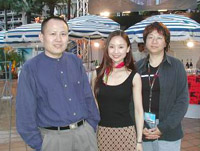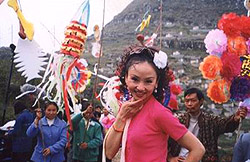|
Wailing Winner
|
| |

The moment Cry Woman ended, with its close-up of a touching cry, the mini cinema at the DDM Warehouse gallery broke into thunderous applause, an echo of the night, two years ago, when the film was screened at the Cannes Film Festival.
A black comedy written and directed by Chinese independent director Liu Bingjian, the man behind Ink Stone, China's first Hollywood export, which was purchased by 20th Century Fox in 1995, Cry Woman is an amusing look at Chinese culture.
In order to pay the bail for her imprisoned husband, Wang Guixiang (played by Liao Qin), a former opera singer, becomes a professional mourner. But before she can earn enough to make the payment to free him, her husband is killed during an attempted escape. Wang finds herself unable to cry at his funeral, yet hours later, at a businessman's burial, she weeps profusely.
The film, full of humor, guts and determination, won enthusiastic applause after it was shown in the "Un Certain Regard" category of the 2002 Cannes Film Festival. The jury even awarded Liao, the lead actress, a special prize for her performance, a first for this category.
"After the show, a foreign actor told me that he felt like Wang, wearing a mask and living like another person to make a living," says Liu, who brought all of his three productions -- Ink Stone, Cry Woman and Men and Women -- to the local gallery for a special screening. "I think foreigners are not all that interested in China's newly built architectures, but instead in the true spirit of ordinary Chinese people in this era of rapid development. I'm helping them to understand the heart and soul of the Chinese."
As one of China's sixth-generation film directors, 40-something Liu's first film, Ink Stone, which won him nominations for the Gold Croaker Award, is similar to the traditional style of fifth-generation directors like Zhang Yimou. Liu admits that it's his least favorite production, as it is with a heavy dose of patriotism and nationalism.
After Ink Stone, he left commercial filmmaking to focus on his own work, and became an independent filmmaker. The gay subject matter of Men and Women (1999) earned it a ban in China, and Liu is now waiting for the censor's verdict on Cry Woman, which has already been shown in more than 10 countries.
Dressed entirely in black, Liu looks the part of a Chinese indie director, but he is a man of few words, who compares his work with that of a street cleaner. "The street cleaner wonders how to clean a street well, and I wonder how to make a films well. Fame doesn't help either of us do our job," he says.
"Liu has opportunities to make more movies commercially, but he has gone his own way, doing his own thing," says Zhu Hongying, a middle-aged local independent film fan. "And he's been successful doing that. I like Cry Woman a lot. It's a movie of marvelous colors and an avant-garde humor. It's a true release of the director's heart and soul." However, Xiao Xian, another local film fan, finds that the film lacks suspense and creation: He was able to guess the ending from the start.
 The idea for this movie originated from a weird folk custom, "wailing songs," in Anhui Province, where Liu made his first movie Ink Stone in 1994. "In the past, wives there were left alone at home by their husbands who went out on businesses," explains Liu. "These widow-like women created a unique art of crying songs and gathered on special days to cry out together. That was one thread. Then, in 2000, I read a story about a laid-off opera actress who wailed at funerals to make money. The two stories were woven together in the screenplay, which took two years to write."
The fabulous cry at the end of the film arouses a variety of guesses from the audience. Some say this cry feels real compared with her professional wailing, while others say that the heroine is crying not for her deceased husband, but for herself.
"This woman has endured so much for so long," says Liu. "Perhaps at that moment she is recalling her miserable life and hopeless relationship. But that's just my interpretation. It's an open ending, open to different interpretations from the audience."
Cry Woman is not only touching, but also visually dazzling. Liu used a rainbow of gaudy colors, ranging from the actress' dress and makeup to the bright wreaths and paper animals used in the funerals.
In answer to skepticism about the authenticity of the dramatic rural funeral scenes, Liu retorts that nothing was exaggerated. "I've been to some funerals that were just like parties, with programs that included singing pop songs, dancing and even playing mah-jong," says Liu. "For a strong visual effect, I highlighted these vibrant colors, which are everywhere in our lives."
The film's heroine, Liao Qin, an opera teacher at Beijing-based China Traditional Opera Academy, was in her maiden acting debut. "The producer tried to find big stars like Zhang Ziyi, but she was working on Hero and unable to do this film," says Liu. "But Liao is exactly what I wanted for the role, a non-professional actress with some performing background. Chinese filmmakers tend to want big-name stars, but in my opinion, stars are mostly disappointing."
Unlike the sometimes wild camerawork that is often a characteristic of independent films, Liu is lavish in his use of stillness in Cry Woman. "It's my preferred aesthetic. Call me lazy," he chuckles. "I prefer sitting there, quietly observing as an onlooker. I think distant, grand scenes with figures moving within have much more impact."
As for his next project, Liu reveals that he is selecting shooting venues for two new films. One is a black comedy, a kind of game-and-love relationship between an old woman and two young men. The other is the story of love between a woman and her diseased husband, but it is definitely not, as Liu emphasizes, another "Ghost."
"Independent films should have an independent spirit. You have to be completely dedicated to the work. For me, film is like my own child. I have almost no other jobs, and this is the only thing that I like," Liu notes. "I'm of the generation who grew up with film as the only entertainment. Film is so important to us. There is no other way for me to express myself. Only film."
(Shanghai Daily March 31, 2004)
|
|
|

